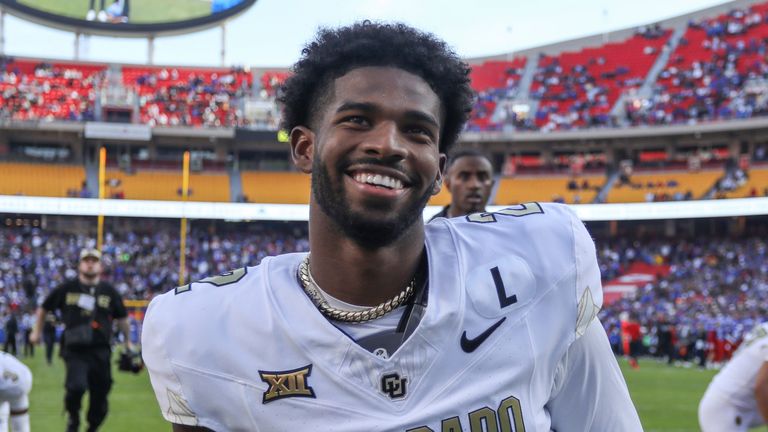If ever there was a case study for the nuances and intricacies of racism in sports, look no further than Shedeur Sanders’ NFL Draft slide. Entering the 2024 college football season, Sanders was widely considered a consensus top-five NFL Draft pick.
There were high expectations for Sanders’ swan song in college. He responded by winning the Johnny Unitas Golden Arm Award as the nation’s best quarterback and led his Colorado Buffaloes to just the school’s third bowl game appearance in the last 15 years.
He was top five in the nation in passing yards (4,134) and touchdowns (37) and led the entire country in completion percentage (74 percent). Miami’s Cam Ward threw for only 200 more yards and two touchdowns than Sanders with similar team success. Through most of the draft process, those two were the topics of debate over who would be the number one overall pick.
Ward went one.
Sanders slid to the fifth round, behind four other quarterbacks.
How is that possible? The answer is prejudice and perception.
Shedeur, the son of NFL Hall of Famer and his head coach at Colorado, Deion Sanders, has been in the spotlight since committing to play under his dad at Jackson State prior to coming to Boulder.
He shares the same moxie and confidence of his father, who was nicknamed “Prime Time.” Deion very famously told the New York Giants he wasn’t going to learn their playbook in the pre-draft process because “I won’t be around for your draft pick.”
Shedeur has had his own share of confident moments. Taunting the Arizona State student section by showing his imaginary (He does own one, though) Rolex watch to his now very famous quote in his combine interview.
“If you ain’t trying to change the franchise or the culture — don’t get me,” Sanders said.
Like father, like son.
He never needed to pander to NFL teams to prove his humility. He didn’t come from a struggle. He came from an affluent family and didn’t have any financial obligations to the NFL. Therefore, he went through his draft process exactly as he was raised to be.
Authentic and Unapologetic.
The establishment doesn’t like confident young black men who don’t bow and grovel at the feet of the NFL. No grateful tears or begging to be selected. A man who knew his worth and acted like it.
The NFL set out to prove a point on draft night.
Let’s be clear: this wasn’t about mis-evaluating Shedeur Sanders’ talent. It was about a collection of NFL franchises that knew they needed a quarterback, deciding to make an example out of him.
There was a real argument that Ward, not Sanders, should have gone No. 1 overall. Ward outperformed Sanders statistically and showed elite quarterback traits, the reason that the debate raged for months. However, between the two projected top signal callers, teams reached for Jaxon Dart (Giants), Tyler Shough (Saints), Jalen Milroe (Seahawks), and Dillon Gabriel (Browns), instead of Sanders.
Dart ran a gimmick offense at Ole Miss and made reckless decisions. Milroe, a freak athlete with a 4.37 forty, couldn’t stop turning the ball over and completed just 64 percent of his passes. Gabriel, under six feet tall, wasn’t asked to make big-league throws in college.
The clearest signs of a concerted effort to make an example out of Sanders came from New Orleans and Pittsburgh. The Steelers, whose only rostered quarterback is Mason Rudolph and his 14-14-1 career record, were expected to grab Sanders at No. 21. They passed. Then they passed again. And again.
As if seemingly realizing that their starting quarterback had thrown only 28 touchdowns next to 20 interceptions in 29 career games played, they finally took a quarterback in the sixth round, having let a former top-five prospect sit untouched for days.
The Saints? They picked 25-year-old Tyler Shough, who completed barely 60 percent of his passes at Louisville and will be 29 when his rookie deal ends. There was not a single draft analyst or expert who projected Shough being picked above Sanders. The Louisville quarterback has nowhere near the accuracy or arm talent. He’s also older, with less room to grow and fewer natural gifts than Sanders. But he’s “humble” and, frankly… white.
This wasn’t about talent. It was about sending a message.
For those who contest and say, “Well, Cam Ward was Black too,” you’re missing the point entirely.
Perception is everything. This wasn’t about color, it was about control.
Ward was seen as humble, not flashy—a quiet leader who went about his business the “right way.” He fit the mold of the humble Black man fitting into a white-owned industry. Shedeur challenged the industry and maintained his authenticity, and they decided to make him sit and think about his actions.
Former Texas A&M quarterback Johnny Manziel was famously drunk and high throughout most of his Heisman-winning career. He still went in the first round of the 2014 NFL Draft. Former Oklahoma running back Joe Mixon and Marshall pass rusher Mike Green, picked in this year’s draft, both carried serious allegations with them. Domestic violence for Mixon. Sexual misconduct for Green. They both went in the second round.
Shedeur Sanders’ “drawback” was self-confidence, instilled in him by his father, a Hall of Famer who taught him not to bow or beg for validation.
How dare he.
Now he makes his way to Cleveland, which chose to draft Gabriel two rounds before him. With no clear established starter on the roster, it’s still very possible—if not likely—that Shedeur wins the starting job by Week 1. If he does, then absolutely no one should be surprised when he has success in the league and dominates NFL defenses for years to come, playing like a top-five draft pick.
You all knew what his talent was. You chose to let prejudice win and to prove a point. And now Shedeur has the chance to make them all pay for it.


